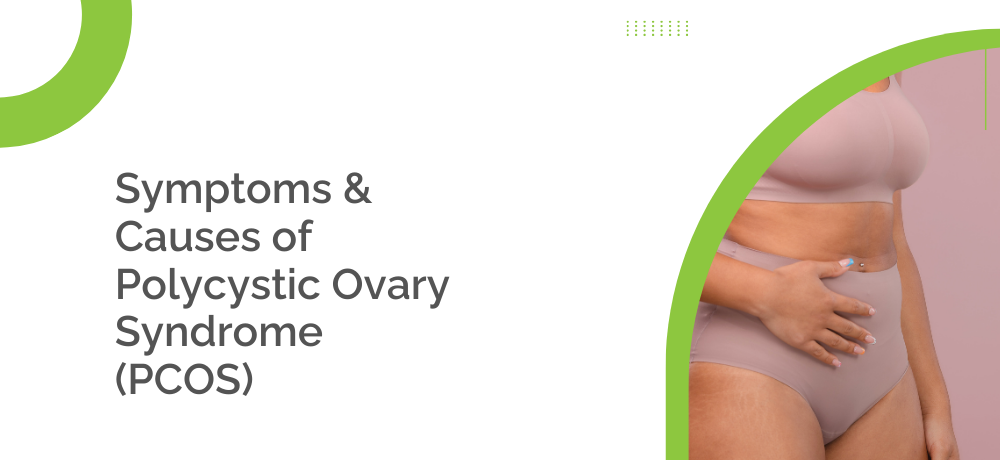Symptoms & Causes of Polycystic Ovary Syndrome (PCOS)
- Tara Andresen
Categories: Blood Sugar Management Fertility Support Hormonal Imbalances Hormone Balancing Menstrual Pain PCOS Treatment women's health Women’s Health Treatment

Polycystic ovary syndrome, commonly known as PCOS, is a hormonal disorder affecting individuals of reproductive age, particularly women. It is a complex condition with a wide range of symptoms and potential causes, making it challenging to diagnose and manage. Understanding the symptoms and causes of PCOS is crucial for early detection and effective treatment. In this comprehensive guide, we delve into the intricacies of PCOS, shedding light on its symptoms, underlying causes, and available treatment options.
1. Understanding Polycystic Ovary Syndrome (PCOS)
What is Polycystic Ovary Syndrome?
Polycystic ovary syndrome (PCOS) is a common hormonal disorder characterized by irregular menstrual cycles, elevated levels of androgens (male hormones), and the presence of small cysts on the ovaries. These cysts are follicles that have failed to release an egg during ovulation. PCOS affects approximately 1 in 10 women of childbearing age and is a leading cause of female infertility.
Symptoms of Polycystic Ovary Syndrome
PCOS presents with a wide range of symptoms, which can vary in severity from person to person. Common symptoms include:
Irregular Menstrual Cycles: Women with PCOS often experience irregular periods or may go for prolonged periods without menstruating.
Excessive Hair Growth: Increased levels of androgens can cause hirsutism, resulting in excessive hair growth on the face, chest, back, or other areas of the body.
Acne: Hormonal imbalances associated with PCOS can lead to persistent acne outbreaks, particularly along the jawline and chin.
Weight Gain: Many women with PCOS struggle with weight gain or find it difficult to lose weight, especially around the abdomen.
Hair Loss: Thinning hair or hair loss, known as alopecia, can occur in women with PCOS due to hormonal fluctuations.
Skin Darkening: Some individuals may develop dark patches of skin, particularly in areas of friction or where skin rubs together, such as the neck, groin, or underarms.
Difficulty Conceiving: PCOS is a common cause of infertility due to irregular ovulation or lack of ovulation altogether.
3. Causes of Polycystic Ovary Syndrome
The exact cause of PCOS remains unknown, but several factors are believed to contribute to its development, including:
Hormonal Imbalance: PCOS is primarily driven by hormonal imbalances, particularly elevated levels of androgens such as testosterone. Insulin resistance, a condition in which cells fail to respond to insulin properly, is also common in women with PCOS and can exacerbate hormonal disruptions.
Genetics: There is evidence to suggest that PCOS may have a genetic component, as it tends to run in families. Women with a family history of PCOS or related conditions, such as diabetes, are at higher risk of developing the disorder.
Lifestyle Factors: Poor diet, lack of exercise, and high levels of stress can contribute to hormonal imbalances and insulin resistance, increasing the risk of PCOS.
Environmental Factors: Exposure to certain environmental toxins or endocrine-disrupting chemicals may play a role in the development of PCOS, although more research is needed to understand the extent of their impact.
4. Treatment Options for Polycystic Ovary Syndrome
While there is no cure for PCOS, various treatment options are available to manage its symptoms and improve overall health. Treatment strategies may include:
Lifestyle Modifications: Adopting a healthy lifestyle, including regular exercise, a balanced diet, and stress management techniques, can help improve symptoms and reduce the risk of complications associated with PCOS.
Medications: Hormonal contraceptives, anti-androgen medications, and insulin-sensitizing drugs may be prescribed to regulate menstrual cycles, reduce androgen levels, and improve insulin sensitivity.
Fertility Treatments: For women trying to conceive, fertility medications such as clomiphene citrate or assisted reproductive technologies like in vitro fertilization (IVF) may be recommended.
Naturopathic Approaches: Naturopathic medicine offers holistic treatment options for PCOS, focusing on addressing underlying imbalances through diet, supplements, acupuncture, and other natural therapies.
At NDcare, we understand the challenges faced by women living with PCOS and are dedicated to providing comprehensive support and personalized care. Our naturopathic clinics in Toronto, Ontario, offer a range of services tailored to address the unique needs of individuals with PCOS, including hormone balancing, acupuncture, nutritional counseling, and stress management techniques.
If you or someone you know is struggling with the symptoms of PCOS, we encourage you to take the first step towards better health by scheduling a free 15-minute information session with one of our experienced naturopathic doctors. To learn more about our services and how we can help you manage PCOS naturally, please click here. If you have any questions or would like to book an appointment, please don't hesitate to contact us at (647) 330-1551 or email info@ndcare.ca. Your journey towards hormonal balance and optimal health starts here.